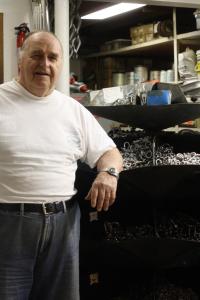Melvin Shepard

1997 North Carolina Fisheries Reform Act
The Fisheries Reform Act is the most significant fisheries legislation in NC history.
In 1994, the North Carolina General Assembly approved a moratorium on the sale of new commercial fishing licenses and established the 19-member Fisheries Moratorium Steering Committee to oversee a study of the state's entire coastal fisheries management process and to recommend changes to improve that process. The Moratorium Steering Committee included legislators, fisheries managers, scientists, commercial fishermen, and recreational fishermen. The committee commissioned six research studies and reviewed a broad range of issues, including fishing licenses, fishing gear, habitat protection, agency organization, and law enforcement. The committee issued a draft report in the late summer of 1996, held 19 public meetings across the state, and adopted a final report in October 1996 that formed the basis for the Fisheries Reform Act. Governor James B. Hunt signed the Act into law on August 14, 1997.
The 1997 North Carolina Fisheries Reform Act: An Oral History Perspective was made possible by the North Carolina Sea Grant Community Collaborative Research Grant Program.
Mary Williford
Melvin Shepard is a long-time resident of Sneads Ferry, North Carolina, with deep roots in the community. Born in Wilmington, North Carolina, Shepard's family has a rich history in Holly Ridge, where his grandfather served as the Atlantic Coastline Railroad Station Master and his grandmother was the Post Mistress. Shepard and his wife, Tilly, have been married since 1955 and have been involved in the commercial fishing industry for many years. Shepard is a unique individual who has managed to balance his interests in commercial fishing and environmental conservation. He has been a board member for the North Carolina Coastal Federation for many years and has been involved in management and politics throughout his career. Shepard considers himself to be 80% environmentalist, believing that all other aspects of his work hinge around environmental concerns. Despite this, he remains a strong advocate for fishing, both recreational and commercial, and believes it to be a privilege that everyone should have.
Scope and Content Note:
This interview with Melvin Shepard, conducted by Barbara Garrity-Blake on May 24, 2016, provides a comprehensive look into Shepard's life, his work in the commercial fishing industry, and his involvement in environmental conservation. Shepard discusses his family background, his business and professional background, and how he and his wife got started in commercial fishing. He also talks about the changes over time in the number and type of commercial fishers in the ocean. Shepard discusses the changes needed to ensure a healthy fisheries environment and the issues with charter boat fishing and licensure. He also talks about the stakeholder groups he aligns himself with and the current state of state government and fisheries. Shepard expresses his concerns about putting environmental concerns first. The interview also covers Shepard's views on the Fisheries Reform Act, the role of the Coastal Resources Commission, and the increased public awareness of water quality issues. Shepard discusses the tensions between commercial and recreational fishers during the Fisheries Reform Act process and his role as a member of the Moratorium Steering Committee and Chairman of the habitat committee. He also talks about the efficacy of the Coastal Habitat Protection Plan. Shepard's interview provides valuable insights into the intersection of commercial fishing and environmental conservation, offering a unique perspective on these interconnected industries.
Please Note: The oral histories in this collection are protected by copyright and have been created for educational, research and personal use as described by the Fair Use Doctrine in the U.S. Copyright law. Please reach out Voices@noaa.gov to let us know how these interviews are being used in your research, project, exhibit, etc. The Voices staff can help provide other useful resources related to your inquiry.
The NOAA mission is to understand and predict changes in climate, weather, oceans, and coasts, to share that knowledge and information with others, and to conserve and manage coastal and marine ecosystems and resources. The Voices Oral History Archives offers public access to a wide range of accounts, including historical materials that are products of their particular times, and may contain offensive language or negative stereotypes.
Voices Oral History Archives does not verify the accuracy of materials submitted to us. The opinions expressed in the interviews are those of the interviewee only. The interviews here have been made available to the public only after the interviewer has confirmed that they have obtained consent.
